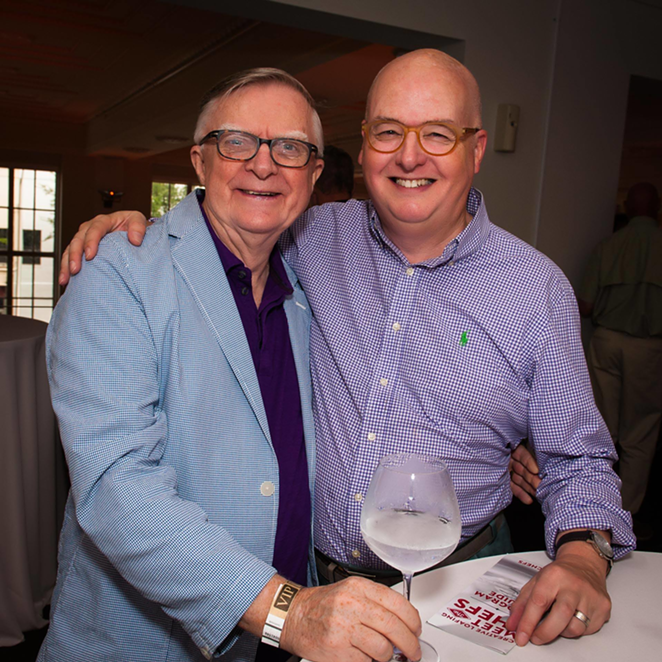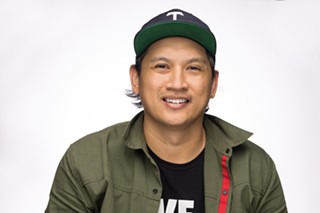For the better part of a decade, Creative Loafing Tampa Bay has worked in concert with St. Pete Pride on production and distribution of its event guide, and despite a pandemic that forced an all-out cancellation of Pride last year, CL and St. Pete Pride teamed up again in 2021 for a standalone guide on stands through the month of June.
A majority of the pages you’re holding in this issue come from the work St. Pete Pride’s contributors did in that guide, but this interview with two men who I’ve admired since I met them is a separate piece.
The Q&A is driven by the activism of David Warner, former Editor-In-Chief at CL and current EIC at Dupont Registry Tampa Bay and his husband, Larry Biddle, who’s currently chairman Community Foundation of Tampa Bay’s “Plus Project,” which raises money then sends grants to programs that support the LGBTQ+ community.
When we caught up, the Florida GOP had just weaseled anti-trans legislation into law, so I asked David and Larry about activism then, now, and in the future.
Here are highlights from our chat.
Progress has undoubtedly been made, but do you ever get that feeling, like “How are we still here and talking about these things?”
Larry Biddle: All the time. You know, a few steps forward, then we’ll start moving back before we go forward again. It’s always been that way. Look at Act Up [AIDS Coalition to Unleash Power].
David Warner: It’s interesting to bring up Act Up because there were many who objected to their tactics. Act Up made it personal and very public. I don’t know whether there’s a way to fight back similarly against this latest attack on the part of the right against LGBTQ+ rights because that was in its time pretty revolutionary.
The struggle to win equality was still relatively young then—Stonewall was ‘69, and this was the ‘80s and ‘90s when the AIDS pandemic was happening—gay politicos who were like, “This is so hard won, we don’t want to alienate people,” they have to admit now that Act Up made a huge difference.
Act Up was controversial similar to the way Black Panthers ruffled a lot of feathers.
DW: Yeah, and even among gay activists. Perhaps more so than now—and it's interesting to think of it in the light of a pandemic—but it was the Act Up forces' willingness to lay themselves down on the line, to make a scene at St. Patrick's Cathedral, to do all kinds of inflammatory gestures that brought the pressure down on the drug companies to make treatments more available.
How can activism play out now?
DW: There’s a Trans Lives Matter movement, particularly because of the violence against trans women in this country. Those stories have to keep getting told. Parents of trans kids are coming out and talking about how this affects them.
And you know there’s got to be legislators, just the way you’ve always known every single legislator, Republican, Democrat or otherwise has someone gay or bi or non-binary these days in their families—so it’s got to be personal for them. That doesn’t necessarily mean that things will change because of that… but it does have to move from there, from the personal stories that gradually change people’s mind so there’s no going back.
DeSantis thinks he has a shot at the White House with anti-Black, “anti-riot,” anti-gay policies. Can he be beaten? Even with all the voter suppression?
DW: He can win a nomination. He can’t win an election. If they make it twice as hard to vote, we have to make it twice as urgent for people to get out and vote. All of us have to be vigilant about how we get our voices heard.
Without having a Pride celebration last year, do you feel like there was a void within the LGBTQ+ community?
LB: I think it made us more politically active because we realized we had so much at stake, more than ever before. And that’s a strange thing to say, but I actually feel like it’s probably true, because we’re all under this oppressive circumstance. We said enough is enough is enough of this jerk, and his lies. They use gay people as a weapon, and they use trans people as a weapon, etc.
Even though we didn’t have Pride last year, I think it refocused us and reformed our way of thinking about waving flags, to saying let’s get politically together here and get the right stuff done. I personally think that this new format is better than what we had before.
DW: I think there’s a lot to be said for what happens in a parade, particularly for those people who are new to the LGBTQ community. So much has changed for us, especially those of us who’ve been out for a long time and seeing how accepting the younger generation is and how things have changed in that level, but I think that it’s still not a given. It’s easy to forget that there are people not far from us who are closeted and scared and and need to believe that there’s hope for them and that there’s a way they can live their life out and happily. I still think there’s a need to express this kind of pride because there are still so many people who can’t feel proud.
A lot of folks haven’t even been able to come out yet.
DW: And you come out every day. You come out when Larry takes my arm or we’re going down a sidewalk in a place that isn’t necessarily a gayborhood or anything. You come out when you talk just in passing, to a cashier about your husband.
All those things, and that was a gradual coming out process, I think, for a lot of us. I mean at first that whole idea of saying somebody was your husband was kind of quaint because there was no way we could ever call each other “husband.” Then when it became possible it was like, “Wow, that’s something to get used to,” and now it’s just a matter of fact. That’s sort of a metaphor for the whole process of coming out in your life I think.
What do you say to the person who feels so energized by Pride that they want to be more of an activist?
LB: Create viable services that are specifically addressing the needs of that community. Get rid of these jerks that are in state legislatures and governorships and so forth—we need to get those people out of office. We have to do both of the things simultaneously. I think the energy is definitely there for that. And I think COVID actually helped kind of concentrate that, more so than anything I've ever seen.
Support local journalism in these crazy days. Our small but mighty team is working tirelessly to bring you up to the minute news on how Coronavirus is affecting Tampa and surrounding areas. Please consider making a one time or monthly donation to help support our staff. Every little bit helps.
Subscribe to our newsletter and follow @cl_tampabay on Twitter.
















